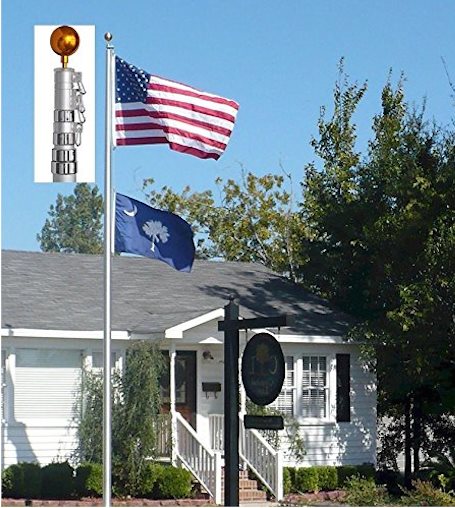Flagpole Tips

Be patriotic. Display an American Flag at your home. CLICK THE PHOTO OF THE FLAG NOW AND HAVE ONE DELIVERED TO YOUR HOME IN DAYS.
Flagpole Tips
I wrote the column about flagpoles as a result of the tragic September 11, 2001, terrorist attacks on our country. Within days of the events, I was flooded with emails from people just like you who were flush with renewed patriotism.
I think it is wonderful and am so happy that so many people have decided to install a flag pole to fly Old Glory.
"Both Buildings Are Going to Collapse"
Firefighting happens to be a hobby of mine. The morning of the attack my wife frantically called down to my office and told me to come upstairs and look at the live TV coverage.
I knew that firefighters were rushing to the scene and I knew they were going into both buildings to rescue people and try to extinguish the fires. But I also knew something else.
I knew both Trade Center Buildings were going to collapse. I said that within a minute of seeing the rerun of the video of the second plane striking the second World Trade Center building.
The structural steel that supports the buildings was severely damaged. Load bearing columns were ripped out by the planes. Other columns had the fireproofing material scraped off. It was just a matter of time before the steel would soften and collapse under the weight of the floors above.
But yet, I knew that firefighters and police officers were climbing the stairs knowing the same thing. They were in a race trying to cool the steel before the collapse would happen. As we know, they lost both races. And we lost hundreds of heroes.
Free & Fast Bids
Some Flagpole Facts
The wind exerts a very strong force on flags. Simply hold up a flag on a windy day and you will see what I mean.
This means that poles need to be sized for the wind speed and for the size of the flag(s) to be flown on the pole. Tall poles need to be large diameter to offset the pull of the wind.
Be sure to match your flag to the size of the pole you buy or make. Most good flag pole manufacturers have sizing charts to help you do this.

Here's a telescoping flag pole. It's perfect for most homes. CLICK THE PHOTO NOW TO HAVE THIS DELIVERED TO YOUR HOME IN DAYS.
In-Ground Pole Drainage
If you decide to do a ground-set pole be aware that the sleeve needs to be able to freely drain collected rain and ground water. If it can't do this, then the pole may rust away over time.
The danger is that the pole can weaken over time and blow over and hurt you or someone else. You can minimize corrosion by making sure the pole is not surrounded by water.
Cut slots in the bottom of any pole sleeve. Set the sleeve on a metal plate and have it welded if possible.
This sleeve sits on a poured concrete footer. Before you pour the concrete that holds the sleeve in place, pour three inches of washed gravel on top of the footer. This is done after the sleeve is in place.
Any water that goes down around the pole drains into the sleeve, exits the sleeve through the slots and then passes through the gravel to the soil. The concrete is simply poured on top of the gravel and it will not clog the gravel passageways. This drainage is very important. Don't overlook it as you build the foundation for your pole.
Homemade Flagpole Parts
If you are on a tight budget there is no reason why you can't make a pretty nice flagpole on your own. The most challenging parts to get are the truck (flagstaff cap) that sits on top of the pole and the sleeve that is placed in the ground. In reality, only the sleeve may present a problem for you.
Different Truck Designs
The truck I saw that works perfectly for a homemade flagpole was sold at a local flag shop in Cincinnati, OH called Flaggs U.S.A.
At this store, I held in my hand a cast aluminum truck that would fit perfectly over the end of a 2 inch diameter galvanized iron pipe.
The cost was about $20.00. If you decide to look at other truck assemblies, you must determine if they fit inside a tube or over the end of the tube.
It makes a big difference! The ones that fit inside a pipe or tube must fit very snugly or you will have all sorts of problems. The one that I saw has mounting bolts that you tighten around the outside of the flagpole pipe. Once tight, the truck will not move on top of the pole. The manufacturers listed below also sell truck parts.
The Sleeve
In the column about flagpoles, I tell you to make a sleeve with a steel plate base. This makes it easy to install the sleeve but the plate is not necessary.
You simply need a pipe sleeve that has an inner diameter slightly larger than the outer diameter of the flagpole pipe. This pipe can rest on the concrete footer at the bottom of the hole.
The challenge is to keep it plumb as you pour the concrete. One method is to tap a slightly oversize square peg into the end of the sleeve. This peg can stick up about a foot or so.
Then extend two pieces of wood over the hole in the shape of the letter X that are nailed to the square peg. Drive stakes into the ground and nail the X pieces to the stakes once the sleeve is plumb.
Column B381
27 Responses to Flagpole Tips